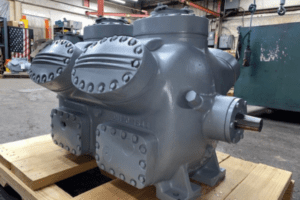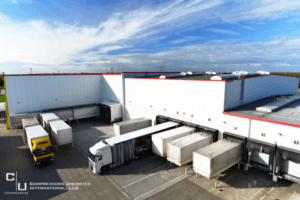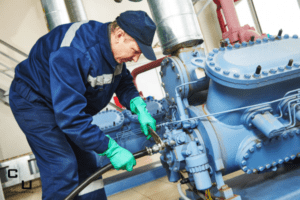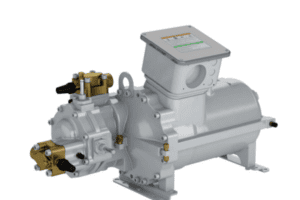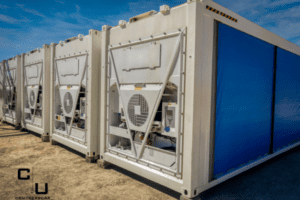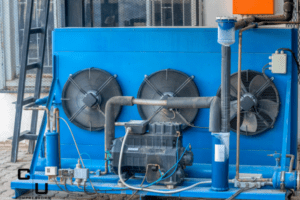It’s finally happening: R-22 refrigerant is being phased out.
And unlike similar phased-out products in the past, it may actually become impossible to find.
If you use a commercial cooling or refrigeration system in your business, it’s important to understand the R-22 phase-out enacted by the Environmental Protection Agency and what it means for you. Your system, including your commercial compressor, relies on using the right refrigerant for its performance specifications.
Let’s review some of the most important frequently asked questions about the R-22 phase-out:
“What is R-22?”
R-22 refrigerant, also called R-22 Freon and HCFC-22 Freon, is a common chemical used in air conditioning and refrigeration systems. The refrigeration cycle relies on repeated phase transitions from a liquid to a gas and back. This is facilitated by the compressor, which pressurizes the gas to make it available to the rest of the system. R-22 is just one of many types of refrigerant, but it was very common before the 2020 EPA announcement.
“Why is R-22 being phased out?”
R-22 is an HCFC (hydrochlorofluorocarbon), an environmentally hazardous chemical that is known to destroy the ozone layer, a protective part of the Earth’s atmosphere responsible for absorbing nearly all the harmful ultraviolet light emitted by the sun. Ultraviolet light is associated with various forms of cancer. Likewise, the HCFC class of chemicals is hazardous to humans. Less harmful alternatives are now widely available.
“Is R-22 refrigerant still available?”
R-22 refrigerant can no longer be imported or made available for sale in the United States. Only recovered R-22 Freon (that is, salvaged from other pieces of equipment) can be used to service equipment. Luckily, many of the world’s compressor manufacturers began preparing for this issue early. Much of today’s equipment can safely use multiple different kinds of refrigerant with no loss of performance.
“Will R-22 really become unavailable?”
Although there’s no way of knowing for sure, it’s best to assume that R-22 refrigerant will ultimately be either impossible to source or prohibitively expensive. Why the uncertainty? Well, R134a refrigerant – a related, but distinct form – was also phased out of vehicle models during the year 2021. However, as of right now, it is still freely available. That said, there are a few good reasons to prepare “as if” the days of R-22 really are numbered.
As the standing supply of R-22 starts to run out, the price is sure to rise. Since most businesses in the supply chain don’t want to get tangled up in litigation around federal rules, a supply might come from unscrupulous actors you can’t necessarily trust to have your best interests in mind. The last thing you would ever want to deal with is refrigerant that’s been adulterated in some way – it is a high probability that is will damage your compressor.
So, while it might be tempting to poke around on the internet looking for the last R-22 Freon available, the best thing to do is make preparations to switch over. If you have a modern commercial or industrial compressor, it will usually be no issue at all to shift over to one of the other approved refrigerants. And if you’re not sure, the best thing to do is to get advice from a compressor remanufacturing team that knows your equipment well.
The End of R-22 Refrigerant Doesn’t Need to Be a Headache for Your Business
If you use a commercial compressor from Trane, Carrier, Copeland, Danfoss, York, or another reputable brand – based in the United States or abroad – odds are good your compressor was already designed for compatibility with multiple refrigerants that have similar performance qualities, not just R-22 Freon.
And you don’t need to worry even if you use a compressor from Bitzer, a German firm, or Hitachi, one of Japan’s most famous brands. Although companies outside of the United States are not necessarily bound by new federal rules, many of them have been working overtime to exceed environmental standards.
Of course, it’s possible your commercial compressor is only designed to use R-22. What then?
Before you make a decision (or, even worse, run out of refrigerant), it’s a wise idea to bring your concerns to a team you can trust, Compressors Unlimited. While it is almost always necessary to maintain the same make and model of compressor your system is used to, there may be a way to retrofit your compressor to expand its refrigerant compatibility.
Eventually, even the best commercial compressors will need to be replaced – and when that day arrives, a remanufactured commercial compressor is a sure choice for reliable performance, lower cost, and far faster fulfillment. Even a problem like the end of R-22 refrigerant can turn out to be a blessing in disguise when you use it to enhance the performance of your system and keep your costs down for years to come.


